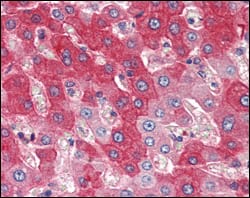
| WB | 咨询技术 | Human,Mouse,Rat |
| IF | 咨询技术 | Human,Mouse,Rat |
| IHC | 1/200 - 1/1000 | Human,Mouse,Rat |
| ICC | 技术咨询 | Human,Mouse,Rat |
| FCM | 咨询技术 | Human,Mouse,Rat |
| Elisa | 1/10000 | Human,Mouse,Rat |
| Aliases | TKF; JTK2; CD334; MGC20292 |
| Entrez GeneID | 2264 |
| clone | 4H2B10B2 |
| WB Predicted band size | 88kDa |
| Host/Isotype | Mouse IgG1 |
| Antibody Type | Primary antibody |
| Storage | Store at 4°C short term. Aliquot and store at -20°C long term. Avoid freeze/thaw cycles. |
| Species Reactivity | Human |
| Immunogen | Purified recombinant fragment of FGFR4 expressed in E. Coli. |
| Formulation | Ascitic fluid containing 0.03% sodium azide. |
+ +
以下是关于FGFR4抗体的3篇参考文献及其摘要内容的简要概括:
1. **文献名称**:*Targeting FGFR4 with a therapeutic antibody inhibits tumor growth in hepatocellular carcinoma*
**作者**:Yao, W., et al.
**摘要**:该研究开发了一种高选择性抗FGFR4单克隆抗体,通过阻断FGFR4与配体FGF19的结合,抑制下游MAPK和PI3K/AKT信号通路,在肝细胞癌(HCC)小鼠模型中显著抑制肿瘤生长,并减少转移。
2. **文献名称**:*FGFR4 antibody-drug conjugate demonstrates potent antitumor activity in rhabdomyosarcoma models*
**作者**:Hagel, M., et al.
**摘要**:研究构建了一种FGFR4靶向的抗体-药物偶联物(ADC),通过抗体特异性结合FGFR4过表达的横纹肌肉瘤细胞,释放细胞毒性药物,在临床前模型中显著缩小肿瘤体积,且对正常组织毒性较低。
3. **文献名称**:*Structural basis of FGFR4 inhibition by a monoclonal antibody for cancer therapy*
**作者**:Chen, X., et al.
**摘要**:通过冷冻电镜技术解析了抗FGFR4抗体与受体结合的分子机制,揭示了抗体通过占据FGFR4的配体结合域阻断二聚化,为优化抗体药物设计提供了结构学依据。
4. **文献名称**:*FGFR4 blockade enhances antitumor immunity by reducing myeloid-derived suppressor cells*
**作者**:Liu, Y., et al.
**摘要**:研究发现抗FGFR4抗体不仅直接抑制肿瘤细胞增殖,还可通过调节肿瘤微环境,减少髓系抑制细胞(MDSCs)的浸润,增强T细胞抗肿瘤免疫反应,在多种实体瘤模型中展现协同疗效。
以上研究涵盖了FGFR4抗体在靶向治疗、药物递送、结构机制及免疫调节方面的应用。
Fibroblast Growth Factor Receptor 4 (FGFR4) is a transmembrane tyrosine kinase receptor that plays critical roles in regulating cell proliferation, differentiation, and tissue repair by binding to fibroblast growth factors (FGFs). Unlike other FGFR family members (FGFR1-3), FGFR4 exhibits distinct ligand-binding preferences and signaling pathways, often linked to metabolic regulation and embryonic development. However, dysregulation of FGFR4—through overexpression, mutations, or aberrant activation—has been implicated in various cancers, including hepatocellular carcinoma, breast cancer, and rhabdomyosarcoma, where it promotes tumor growth, metastasis, and resistance to therapy.
FGFR4-targeting antibodies are therapeutic or diagnostic tools designed to block FGFR4 activity. These antibodies typically inhibit ligand-receptor interactions, prevent receptor dimerization, or trigger antibody-dependent cellular cytotoxicity (ADCC). In oncology, FGFR4-specific monoclonal antibodies (e.g., FGF401. now in clinical trials) aim to suppress oncogenic FGFR4 signaling driven by genetic alterations or autocrine/paracrine FGF19 activation. Challenges include achieving receptor specificity to avoid off-target effects on other FGFRs and overcoming potential resistance mechanisms, such as compensatory signaling or FGFR4 structural mutations. Beyond cancer, FGFR4 antibodies are also explored in metabolic disorders due to the receptor’s role in bile acid and glucose homeostasis. Current research focuses on optimizing antibody affinity, pharmacokinetics, and combination therapies to enhance clinical efficacy.
×